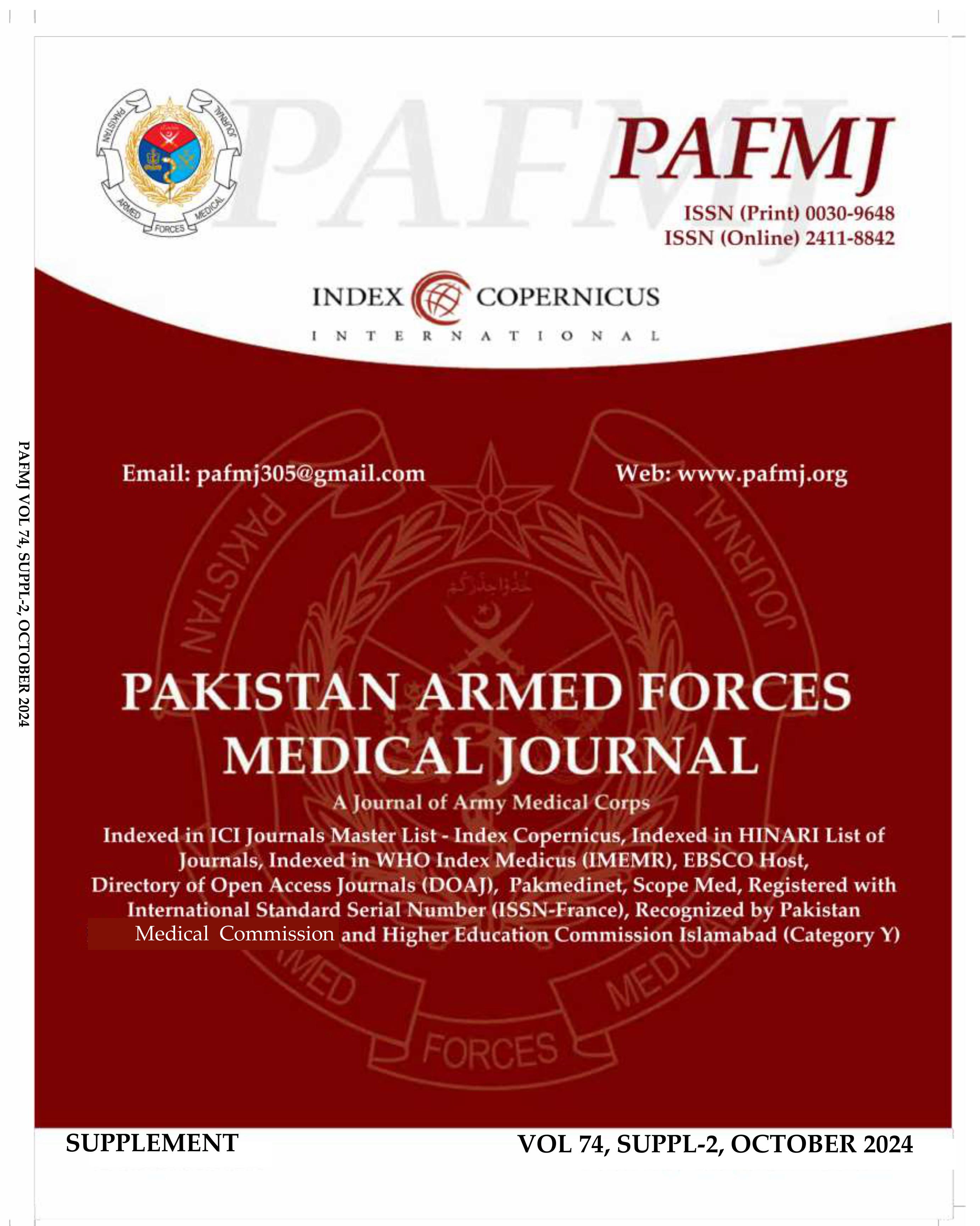Exploration of Teaching Methodology in a Medical College, Rawalpindi: A Qualitative Assessment from Students’ Perspective
DOI:
https://doi.org/10.51253/pafmj.v74iSUPPL-2.2941Keywords:
Assessment, Case base learning, Lectures, Teaching methodology, Teaching technique.Abstract
Objective: To explore how to improve teaching methodology in a medical college from students’ perspective.
Study Design: Qualitative grounded theory study design using constructivist approach.
Place and Duration of Study: Conducted at public sector medical college of three-months duration from Dec 2016 to Mar 2017.
Methodology: A grounded theory approach was used explore student’s perspective of how to improve teaching methodologies. Two focus group discussion of 4th and final year MBBS students were conducted. Data were collected on semi-structured questionnaire and analyzed manually by thematic analysis.
Results: There were five main themes which are as follows: Teaching techniques, students’ assessment, and clinical rotation, extra-curricular and future prospects. In teaching techniques further 4 sub-themes emerged i.e. lectures, slides, courses and attendance. In student assessment further four sub-themes emerged as exams, practicals, viva and CBLS. In clinical rotations, three sub-themes emerged as ward rounds, surgical operations and timings. In extracurricular activities, three sub-themes emerged as sports, workshops and research. In future prospects only two sub-themes emerged as alumni and affiliations. All of the sub-themes had the problem narrated with their suggestive solutions. For example; in teaching techniques the suggestions were decreasing duration of lectures, breaks in-between lectures and lecture being more interactive.
Conclusion: The teaching methodology lacks a practical approach regarding medical studies along with lack of student- teacher interaction. Students should be asked to give active feedback regarding any changes that they would want; this would not only help break down the barrier between students and teachers but also all
Downloads
References
Pakistan Medical & Dental Council. List of Approved Hospitals for House job. Available from: http://www.pmdc.org.pk/ AboutUs/ListofHospitals/tabid/111/Default.aspx [Accessed 12th June 2017].
Rathnakar UP, Sheetal DU, Preethi GP, Rojeshwari S, Pemminati S. Is small group teaching among the undergraduate dental students really effective? JCDR 2011; 5(4): 822-825.
Devlin M, Samarawickrema G. The criteria of effective teaching in a changing higher education context. Higher Education Research & Development 2010; 29(2): 111-124.
https://doi.org/10.1080/07294360903244398
The Glossary of Education Reform. Student Centered Learning. Available from: http://edglossary.org/student-centered-learning/ [Accessed 7th May 2017].
An Overview of Medical Education in Pakistan and the Improvements Required. 21 August, 2012. Journal of Pioneering Medical Sciences Blogs. Available from:
http://blogs.jpmsonline.com/2012/08/21/an-overview-of-medical-education-in-pakistan-and-the-improvements-required. [Assessed 15th June 2017].
Towle A. The impetus for innovation. innovative learning and assessment, sharing ideas. London3, Kings Fund Centre 1994: 2-4.
Kharb P, Samanta PP, Jindal M, Singh V. The learning styles and the preferred teaching—learning strategies of first year medical students. J Clin Diagn Res 2013; 7(6): 1089-1092. https://doi.org/10.7860/JCDR/2013/5809.3090
Rao SP, DiCarlo SE. Peer instruction improves performance on quizzes. Advances in Physiology Education 2000; 24(1): 51-55.
https://doi.org/10.1152/advances.2000.24.1.51
Sankey MD, Birch D, Gardiner MW. The impact of multiple rep-resentations of content using multimedia on learning outcomes across learning styles and modal preferences. Int J Educ Dev using ICT 2011; 7(3): 18-35.
Kumar S. An innovative method to enhance interaction during lecture sessions. Advances in physiology education 2003; 27(1): 20-25. https://doi.org/10.1152/advan.00043.2001
Feletti GI, Smith EK. Modified essay questions: are they worth the effort?. Medical Education 1986; 20(2): 126-132.
https://doi.org/10.1111/j.1365-2923.1986.tb01059.x
Schuwirth LW, van der Vleuten CP. ABC of learning and teaching in medicine: written assessment. BMJ: British Medical Journal 2003; 326(7390): 643-645.
https://doi.org/10.1136/bmj.326.7390.643
Stokes JF. The clinical examination: assessment of clinical skills. Association for the Study of Medical Education; 1974.
Nithyanandam S, Joseph M, Vasu U. Can conventional long case examination be improved?. Indian J Ophthalmology 2012; 60(4): 333. https://doi.org/10.4103/0301-4738.97093
Nair SP, Shah T, Seth S, Pandit N, Shah GV. Case based learning: a method for better understanding of biochemistry in medical students. Journal of clinical and diagnostic research 2013; 7(8): 1576-1578.
https://doi.org/10.7860/JCDR/2013/5795.3212
Davis BG. Tools for teaching 2nd Edition. John Wiley & Sons; 2009.
Balasooriya C, Olupeliyawa A, Iqbal M, Lawley C, Cohn A, Ma D et al. A student-led process to enhance the learning and teaching of teamwork skills in medicine. Education for Health 2013; 26(2): 78-84. https://doi.org/10.4103/1357-6283.120698
Stewart R.A., Hauge L.S., Stewart R.D., Rosen R.L., Charnot-Katsikas A., Prinz R.A. A CRASH course in procedural skills improves medical students' self-assessment of proficiency, confidence, and anxiety. American Journal of Surgery 2007; 193(6): 771-773.
https://doi.org/10.1016/j.amjsurg.2007.01.019
Hunter AB, Laursen SL, Seymour E. Becoming a scientist: The role of undergraduate research in students' cognitive, personal, and professional development. Science Education 2007; 91(1): 36-74. https://doi.org/10.1002/sce.20173
Adeleye OA, Eze GU. Anticipated specialties and influencing factors among final year medical students in a Nigerian University. Pak J Med Sci 2010; 26(3): 510-514.
Mwachaka P, Mbugua E. Specialty preferences among medical students in a Kenyan university. Pan African Medical Journal 2010; 5(1).
Bittaye M, Odukogbe AT, Nyan O, Jallow B, Omigbodun AO. Medical students’ choices of specialty in The Gambia: the need for career counseling. BMC Med Educ 2012; 12(1): 72.
https://doi.org/10.1186/1472-6920-12-72
Weissman C, Zisk-Rony RY, Schroeder JE, Weiss YG, Avidan A, Elchalal U et al. Medical specialty considerations by medical students early in their clinical experience. Israel journal of health policy research 2012; 1(13): 1-10.
Downloads
Published
Issue
Section
License
Copyright (c) 2024 Naseer Alam Tariq, Amna Yousaf Shah, Adeel Ahmed Jafri, Azka Aslam Bajwa

This work is licensed under a Creative Commons Attribution-NonCommercial 4.0 International License.















